 Headline News
Headline News
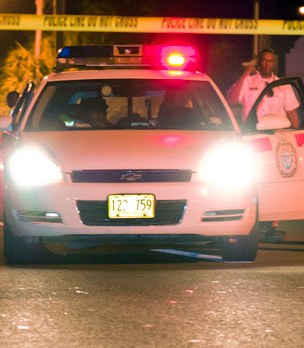
Robber numbers unknown
 (CNS): As police charged another suspect robber on Monday in connection with a robbery at a West Bay convenience store last weekend, one RCIPS top officer says it is impossible to say how many more robbers are still out there. Despite the increase in the number of people charged with the crime, robberies are still occurring on a frequent basis and DS Marlon Bodden said they continue to be a mix of organised and opportunistic crimes, with evidence of copycat robbers as well. Bodden said the police view all robberies and all victims as equal, be it a bank or a convenience store, and the most important issue at present is that officers are leaving no stone unturned in their efforts to catch the criminals.(Photo Dennie WarrenJr)
(CNS): As police charged another suspect robber on Monday in connection with a robbery at a West Bay convenience store last weekend, one RCIPS top officer says it is impossible to say how many more robbers are still out there. Despite the increase in the number of people charged with the crime, robberies are still occurring on a frequent basis and DS Marlon Bodden said they continue to be a mix of organised and opportunistic crimes, with evidence of copycat robbers as well. Bodden said the police view all robberies and all victims as equal, be it a bank or a convenience store, and the most important issue at present is that officers are leaving no stone unturned in their efforts to catch the criminals.(Photo Dennie WarrenJr)
DS Bodden said that the recent success in arresting some of the suspects comes down to a combination of issues, and the public was taking on board many of the crime prevention tips that the police have been circulating. “Swift positive investigative action, enforcement and businesses maximizing the safety of their establishment, customers and employees” have helped, as has the “greater descriptive information emanating from witnesses,” he said, adding that information still varies depending on the age, gender and experience of the witness.
Although the police have made a significant number of arrests recently, Bodden stated that the police are not letting up as there are still a number of robberies that remain unsolved, including three bank robberies over the last year.
“We continue to place quality, investigative focus on all outstanding robberies,” DS Bodden said. “We don’t view one victim as more important than any other; we care about all victims of robberies or serious crimes. Unfortunately, some crimes take much longer to solve than others, and bank robberies sometimes fall within that framework. The important point is that we are not leaving any stone unturned and we are just as anxious to solve these crimes as the public would like to see.”
Bodden said that the bank robberies were obviously more organised as the criminals have to think hard and long about undertaking such a task, but he said police were profiling the crimes, looking at timelines and methods of operation, and he said and they were seeing evidence of copycats and opportunistic criminals.
“Robbery is a time crime, and the robber will use whatever choice of weapon that will yield quick success," he explained as he spoke about the risks robbers were taking with firearms, in some cases for small amounts of money, adding that a robber just doesn’t want to be caught. “That’s the bottom line,” Bodden said. “It will depend on the need and opportunity if a robber will choose to carry a gun, knife or stick. As it relates to value, the equation is high visibility of customers, equals money, equals worth the risk. That’s the motivation for a robber.”
His advice to small businesses was to use their eyes and be aware of what’s going on. “Awareness is the key, they need to always give the appearance that there’s nothing on premises worth stealing,” the senior officer said. Signs stating ‘no money kept on premises’, sharing information with other businesses and neighbours about tackling crime were important tools in preventing crime, he said, as well as reporting suspicious activity and training staff on how to react before, during and after the commission of a crime. He also said business owners should use proper safes and maintain a proper security policy with the aim of developing a culture in their business that encourages everyone to think about security.
In the latest case coming before the courts today (Monday 14 March) police have charged a 32-year-old man with robbery and possession of an imitation firearm in connection with the hold-up at 3N’s grocery store in Batabano Plaza, West Bay. At around 8.00pm on Saturday 5 March a masked man, armed with what witnesses said appeared to be a firearm, entered the store, threatened staff and demanded cash. The suspect then made off from the scene with a small sum of money. No shots were fired and no-one was injured in the incident. The man was arrested just a short time later following a police operation in the district.

New law fills up Grand Court lists
 (CNS): Recent changes to the Criminal Procedure Code have led to a number of serious criminal cases reaching the Grand Court within days of charges being laid by police. Two men accused of mugging tourists at Barefoot Beach in East End and another two defendants charged with the West Bay Tortuga robbery appeared in the Grand Court Friday morning on what was already a long list of first time case mentions. Neither Dennis Jordan Ebanks and John Jason McLaughlin, who are charged with robbing over $2,000 from the Tortuga store, nor Michael McLaughlin and Trent Bodden, who are accusing of taking $20 and an underwater camera from a couple at the beach in East End, entered pleas as no papers were prepared in the cases.
(CNS): Recent changes to the Criminal Procedure Code have led to a number of serious criminal cases reaching the Grand Court within days of charges being laid by police. Two men accused of mugging tourists at Barefoot Beach in East End and another two defendants charged with the West Bay Tortuga robbery appeared in the Grand Court Friday morning on what was already a long list of first time case mentions. Neither Dennis Jordan Ebanks and John Jason McLaughlin, who are charged with robbing over $2,000 from the Tortuga store, nor Michael McLaughlin and Trent Bodden, who are accusing of taking $20 and an underwater camera from a couple at the beach in East End, entered pleas as no papers were prepared in the cases.
Michael McLaughlin appeared without an attorney and told the court he wanted to represent himself but he was warned by Justice Marva Mcdonald-Bishop that, given the charges against him, he needed legal representation and advised him to find a lawyer as he would be entitled to legal aid. She asked him if he was trained in the law, and when the accused man said he was not she pointed out that he must be given an opportunity to find an attorney so that further down the line, if he was convicted of the crime, he couldn’t claim he was not given an opportunity to be properly represented.
As a result of the recent legislative changes that allow serious criminal cases to be delivered up to the Grand Court without the need for a preliminary enquiry, the number of defendants on the list for the mention on Friday morning had grown significantly.
With no indictments prepared by the crown in the new cases, ongoing legal wrangling with older cases and a shortage of attorneys willing to undertake criminal legal aid work, many of the cases were passed over to new dates. However, with a shortage of courtroom space, the judge had to warn the lawyers on both the crown and the defence sides to limit the cases they were setting for the weeks ahead as she said the lists would simply become too long to be handled.
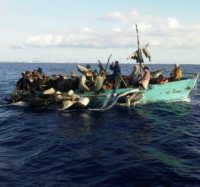
Cubans opt to come ashore
 (CNS): After well over a year without a single vessel containing Cuban migrants being reported in Cayman waters, the second boat in just over a month was intercepted off the north coast of Grand Cayman today. Department of Immigration officials reported that a Cuban vessel carrying 21 people was spotted by a joint immigration, customs, RCIPS marine unit at around 3pm Thursday afternoon. Deputy Chief Immigration Officer Enforcement Gary Wong said that a couple from the craft decided to come ashore. Police confirmed that the vessel was seaworthy. (Photo by Dennie Warren Jr)
(CNS): After well over a year without a single vessel containing Cuban migrants being reported in Cayman waters, the second boat in just over a month was intercepted off the north coast of Grand Cayman today. Department of Immigration officials reported that a Cuban vessel carrying 21 people was spotted by a joint immigration, customs, RCIPS marine unit at around 3pm Thursday afternoon. Deputy Chief Immigration Officer Enforcement Gary Wong said that a couple from the craft decided to come ashore. Police confirmed that the vessel was seaworthy. (Photo by Dennie Warren Jr)
Meanwhile, the other 19 refugees, including one female, indicated their intention to continue on their journey to Honduras in the boat.
The couple who opted to come ashore were brought to the George Town Barcadere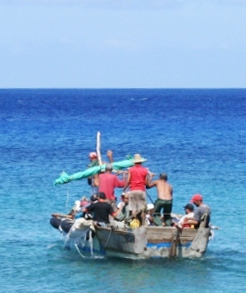 , sources revealed. The husband and wife, both aged 28, are now in custody and being processed by immigration officials before being deported back to Cuba.
, sources revealed. The husband and wife, both aged 28, are now in custody and being processed by immigration officials before being deported back to Cuba.
The vessel, which has continued on its journey, was originally spotted yesterday off the coast of Cayman Brac and is the second boat after some 14 months to be intercepted.
The last vessel stopped by officials was carrying 16 migrants in a 21 foot vessel (pictured right) and those aboard opted to carrying on their journey without assistance from local officials under the terms of the MOU Cayman has with the Cuban Government.
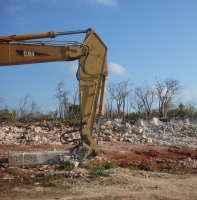
Hurricane Hilton happening
 (CNS): Almost half a million dollars has already been spent this year on building material to begin construction of a new emergency facility on Cayman Brac’s Bluff. Ministry of District Administration, Works, Lands & Agriculture Acting Chief Officer Tristan Hydes said that $477,749 (just over half of the $900k in this year’s budget) has been used to purchase materials such as cement and fill, and that the rest of the funds will be spent on consultants as well as the foundation for the main hall of the project. Request for tenders for the 27,000 square foot foundation closed last week and the award, which is being conducted through the Central Tenders Committee, is scheduled around 18 March.
(CNS): Almost half a million dollars has already been spent this year on building material to begin construction of a new emergency facility on Cayman Brac’s Bluff. Ministry of District Administration, Works, Lands & Agriculture Acting Chief Officer Tristan Hydes said that $477,749 (just over half of the $900k in this year’s budget) has been used to purchase materials such as cement and fill, and that the rest of the funds will be spent on consultants as well as the foundation for the main hall of the project. Request for tenders for the 27,000 square foot foundation closed last week and the award, which is being conducted through the Central Tenders Committee, is scheduled around 18 March.
Public Works Department workers are also in the process of preparing the site, located east of the playing field, using their excavator to chip away about 200 feet of an outcrop of the Bluff.
The finished two-story 36,111 square foot building, dubbed locally as the “Hurricane Hilton”, will have a main hall and 80 private rooms with shared bathrooms for each pair of rooms.
Hydes said that the project will be tendered in phases rather than a single tender for the whole building. “All tenders of this magnitude are conducted through CTC,” Hydes said, adding that the first tender for the project was available for viewing on the CTC website (although it still has not appeared online) and that PWD on the Brac had several copies of the documents for distribution. Plans were drawn by PWD architects in Grand Cayman, Hydes stated. “PWD are the lead architects and project managers on this project; however, they have also employed other ‘consultants’ to assist,” he said.
Planning approval for the new hurricane shelter, which has an estimated total cost of $9 million, was given last year by the Cayman Brac and Little Cayman Development Control Board and the Building Control Unit has now issued a foundation permit. Deputy Premier and District Administration Minister Juliana O’Connor Connolly told CNS in July last year that site preparation and purchase of some preliminary resources was achieved with the $500,000 in last year’s budget, and the $900,000 in this year’s budget would almost complete the main hall. The ministry now says the main hall should be completed in the next budget year.
“The ministry is aiming to spend all monies in this year’s budget, including the foundation and some superstructure. We also plan to purchase some plant/building material that is immediately required. It is being undertaken in a phased approach, in an effort to spend the money wisely and to spread the costs over a period of time,” Hydes said.
According to the plans, in phase 1 (the main building) the first storey will include the main hall, plus a sick bay, reception area, kitchen and several bathrooms. The second floor will include the command centre, office and conference room. Phase 2 consists of four 2-storey “wings” to the building, each wing with 10 private rooms on each floor, each room with a semi-private bathroom (one for every two rooms).
“One of the lessons of Paloma was that there were too many needs for one hall,” O’Connor Connolly has previously said. The rooms will have individual temperature control, according to the deputy premier, who noted that during Hurricane Paloma, some people were too hot and some were too cold, and that there was no privacy for the elderly or disabled.
The main hall will accommodate up to 400 people in a storm and each wing will house an additional 100 adults, so the new building adds another 800 shelter spaces to Cayman Brac.
O’Connor-Connolly has said the main hall will also be used for inside sports, such as squash, badminton, netball and basketball, and with the rooms it can accommodate visiting teams and can be used for conferences and retreats.
When there is an emergency, the private rooms will be allocated on a ‘first come, first serve’ basis, though the deputy premier has said that if a major hurricane was approaching they could allocate one wing for hospital patients.
This new emergency shelter will be the fourth on the island. The Aston Rutty Civic Centre on the Bluff can hold approximately 500 people, while the West End Primary School, which has been structurally upgraded since Paloma, can hold 250, and the Brac Day Care Centre, located next to the civic centre, can hold 155.
The District Administration Building, while not an official emergency centre, also shelters DA staff and their families, and the rebuilt Veteran’s and Seaman’s Center is an unofficial shelter. In addition, many new homes are being built on the Bluff, where people remain during a storm, and two new churches on the Bluff that were built to hurricane standards have been recently completed.
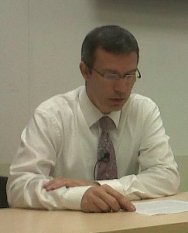
Cabinet ignored commission
 (CNS): Two members of the Constitutional Commission have revealed that government ignored its advice when it came to drafting the legislation for the establishment of advisory district councils. Wil Pineau said that the commission had hoped government would have waited for the results of research currently underway that may have helped create more effective councils. His fellow commissioner, Julene Banks, said the commission had envision the councils to be more democratic and shaped more like the existing district council in North Side, where members have been elected by people living in that community. However, Cabinet chose not to consider their input before it went ahead and passed legislation earlier this year.
(CNS): Two members of the Constitutional Commission have revealed that government ignored its advice when it came to drafting the legislation for the establishment of advisory district councils. Wil Pineau said that the commission had hoped government would have waited for the results of research currently underway that may have helped create more effective councils. His fellow commissioner, Julene Banks, said the commission had envision the councils to be more democratic and shaped more like the existing district council in North Side, where members have been elected by people living in that community. However, Cabinet chose not to consider their input before it went ahead and passed legislation earlier this year.
The commissioners were speaking at a press briefing earlier this week, convened to launch the Constitutional Commission’s new website. Pineau and Banks both said that the people needed to know more about the process of government in the Cayman Islands. Pineau stated that people needed the answers to questions, such as how Cabinet was advised, how decisions were made and how policies were arrived at to ensure good governance.
He said the commission was involved in a major research project about the country’s system of governance, which he said he hoped would offer answers to these and many other questions about how Cabinet receives advice and how people access their representatives and voice their opinions.
“We hoped Cabinet would have waited before rushing ahead with advisory district council legislation for some of the results of this research,” Pineau said. “We are doing the research to evaluate how government works and what we have already … We wanted to understand what the role of the councils would be.”
Pineau said the research could have determined whether advice is being duplicated, how costly it all would be and how effective and efficient the system is and where improvements were needed, but he said the government decided to go ahead with the law.
“We don’t agree with what is in place at the moment,” Banks, the commission’s legal expert said, about the Advisory District Council Law 2010.
The premier passed the legislation in January which caused a certain amount of controversy as Cabinet will be appointing the majority of the members of the council, as opposed to allowing town hall style elections, as is the case with the country’s only existing council established by independent MLA Ezzard Miller.
Despite being ignored, the commissioners said their goal was still to make government and governance as transparent as possible and they would be encouraging open dialogue at their forthcoming meetings about the district councils. Banks said they hoped to begin the meetings in North side, where they could see how that existing council was functioning.
The commissioners said that the people had to understand that the representatives of the Legislative Assembly were constitutionally bound to represent the people and the governance research paper would establish how they do this and how well they do it at present.
Banks spoke about the need for a bi-partisan approach in some areas and revealed the concerns of stakeholder groups that the commission has spoken with about how good policies and projects are stopped or even reversed whenever there is a change of government without due consideration. She said that people discuss their concerns and complaints behind closed doors but less so publicly and hoped they would come forward and help find the solutions for better governance.
Portal opens on Cayman’s Constitution
(CNS): The Constitutional Commission has launched its much anticipated website, which will become the primary tool for educating the wider public about the Cayman Islands Constitution 2009. www.knowyourconstitution.ky will serve as a focal point for promoting what the constitution means for the people and to encourage their participation, which in turn will promote more transparent governance in the country. The website has educational materials for teachers, downloadable copies of the constitution, discussion papers on constitutional matters, as well as legislation and minutes of meetings.
Part of the goal to create openness, transparency, debate discussion and understanding, the website is one of the ways the commissioners hope people will come to familiarise themselves with and understand the country’s constitution and how it can empower them to hold government accountable, said Constitutional Commission Member Wil Pineau.
As well as a portal for facts, resources, the answers to questions, documents and minutes, the website is designed to be an interactive tool and the commissioners want people to submit comments and questions and concerns and for people to post ideas, relevant discussion papers and school projects or lesson plans.
“The constitution belongs to the people of the Cayman Islands so it is critical that everyone understands and protects its provisions,” Pineau said at a briefing to launch the website on Tuesday. “The only way our citizens can carry out this important responsibility is to get involved and to learn the constitution. “
As the commission supports open and transparent public discussion, all of its own reports, discussion documents and minutes are on the site. It also has a list of frequently asked questions but Pineau stated that the commission was hoping to have more submitted from the public.
The website comes ahead of a planned series of meetings beginning in April, when the commissioners will be heading out to meet the people face to face inall six districts to start promoting and educating people about their constitutional rights in partnership with the elected district representatives.
“These public meetings and discussions will allow us to meet residents and to explain our work and to answer any questions about constitutional matters,” Pineau said, adding that the dates and locations would soon be released once they had been confirmed. “People do have another voice via the constitution,” he added.
Education is the Constitutional Commission’s primary purpose and Pineau said the meetings would be interactive and allow people to raise their issues and concerns and address the many misunderstandings about governance in general.
“There is misunderstanding in the community about the constitution and issues of good governance and the areas that need to be enforced,” he said. “When people understand the system of governance then they are empowered and can have their concerns addressed. If they don’t they are at a disadvantage.”

Two more charged over cash shop heist
 (CNS): A 28 year old woman and a 26 year old man have now been charged in connection with a suspected robbery at a money transfer store in George Town earlier this year. Police have already charged two other men, aged 19 and 21 years, with theft, conspiracy to steal and possession of an unlicensed firearm concerning what is believed to have been a staged hold up at the Reggae Money Express at Elizabethan Square on Saturday 15 January. Police said today Tuesday (8 March) that the 26 year old man was charged with accessory after the fact and possession of criminal property and the 28 year old woman with interfering with a criminal proceeding and theft.(Photo Dennie Warren Jr)
(CNS): A 28 year old woman and a 26 year old man have now been charged in connection with a suspected robbery at a money transfer store in George Town earlier this year. Police have already charged two other men, aged 19 and 21 years, with theft, conspiracy to steal and possession of an unlicensed firearm concerning what is believed to have been a staged hold up at the Reggae Money Express at Elizabethan Square on Saturday 15 January. Police said today Tuesday (8 March) that the 26 year old man was charged with accessory after the fact and possession of criminal property and the 28 year old woman with interfering with a criminal proceeding and theft.(Photo Dennie Warren Jr)
Both of them were scheduled to appear in summary court Tuesday afternoon.
On the evening of the incident police said that they had received a report of a robbery only yards from the police headquarters which is also located in Elizabethan Square, at around 6pm.
Police were told that a man had entered the premises with what was believed to be a firearm, threatened staff and made off with a sum of cash. No shots were fired no-one was injured in the incident. Later that evening, following a police operation in the George Town area involving uniform, CID and armed officers, two men were arrested.

US concerned over financial crime in Cayman
 (CNS): The United States government has raised concerns about financial crime in the Cayman Islands in volume two of the 2011 International Narcotics Control Strategy Report (INCSR) published this month by the State Department. The document says that in Cayman most “money laundering is primarily related to fraud and drug trafficking” but because of its status as a zero-tax regime, the State Department said, the jurisdiction is "also considered attractive to those seeking to evade taxes” in their home countries. The report further criticises the Cayman Islands about the very low number of successful prosecutions for financial crime and money laundering that have taken place here given the size of the financial sector.
(CNS): The United States government has raised concerns about financial crime in the Cayman Islands in volume two of the 2011 International Narcotics Control Strategy Report (INCSR) published this month by the State Department. The document says that in Cayman most “money laundering is primarily related to fraud and drug trafficking” but because of its status as a zero-tax regime, the State Department said, the jurisdiction is "also considered attractive to those seeking to evade taxes” in their home countries. The report further criticises the Cayman Islands about the very low number of successful prosecutions for financial crime and money laundering that have taken place here given the size of the financial sector.
"While the country has increased both its regulatory and law enforcement staffing, the number of prosecutions and convictions is extremely low, given the vast scale of the country’s financial sector," the report stated, adding that only six successful prosecutions for money laundering and only one in the last four years have taken place.
In addition, the report said, the "lack of penalties" for failing to report ownership and identity information "undermines the effectiveness” of these obligations. "This is a problem in particular for an estimated 3,000 unregulated mutual funds resident in the Cayman Islands," said the INCSR, which noted that there appeared to be no requirements for companies, trusts and partnerships to retain records for at least five years.
However, recent legislative changes to a number of the laws relating to the offshore sector have addressed the reporting issue, which was also flagged by the IMF in its recent review.
The report goes on to urge the Cayman Islands to continue computerising various registrations, such as those for mutual funds. There is "a need to pay greater attention to the risks and proper supervision of non-profit organisations," the report states.
Listing Cayman as a “jurisdiction of primary concern” alongside countries such as Afghanistan, Luxembourg, Nigeria, Switzerland, the United Kingdom and the United States, the authors of the report explain that countries are categorized based on transactions involving significant amounts of proceeds from crime and not the jurisdiction’s legal framework to combat money laundering.
Tough prisons don’t work, says Manderson
(CNS): The chief officer of the Portfolio of Internal and External Affairs has said that “tough prisons do not make good prisoners, just tough prisoners” and they certainly don’t help with the problem of recidivism. With the country’s prison system coming under the spotlight as the numbers of people incarcerated grows, Franz Manderson has said that the portfolio is focusing on how to rehabilitate offenders and stop their criminal behaviour in order to tackle the high rate of repeat offending. He said the public needed to understand that the loss of liberty is the punishment and that when inmates are incarcerated they should not be mistreated by the system itself but given an opportunity to change their ways. (Photo: Prison cell at Northward courtesy of Cayman 27)
“We don’t send people to prison to be punished at the prison,” Manderson said. “The punishment is the loss of liberty. While inmates are incarcerated they should be given their basic rights.”
With the recent increase in crime there is a widely held misconception in the community that HMP Northward is a glorified hotel and that prisoners are not suffering as a result of being locked up. Having taken up the gauntlet of dealing with the prison system since the death of the former corrections commissioner William Rattray, Manderson says prisoners are by no means living in the lap of luxury at the country’s prison as is commonly believed.
He said that the prisoners are not and should not be cruelly treated because they are incarcerated. Manderson said there was a need to focus on rehabilitation and addressing the behaviour that led to people being involved in crime – not punishing prisoners more.
He explained that the goal is to use the time inmates spend in prison constructively to address the reasons why they offend and to give them the tools to help them lead a crime free life when they return to the community in order to try and reduce what are particularly high recidivism rates here in Cayman. He said that trying to make prisons tough simply does not work.
“I looked at some of the toughest prisons in the world and they did not make good prisoners, just tough prisoners who reoffend,” he said, pointing to Jamaica as an example. “Everyone agrees that the prison system in our neighbouring country is tough but this has not helped to reducecrime in that country,” Manderson added.
There is considerable evidence to support the chief officer’s position as prison reformers have said for many years that mistreating prisoners, holding them in over-crowded conditions or keeping them locked down does not act as a deterrent or ‘teach prisoners a lesson’, as is commonly believed. The theory that harsher prison treatment reduces inmates’ future criminal activity is not born out in study after study, despite the support of the public that inmates should be made to suffer hardships while they are incarcerated.
With a growing population of increasingly serious offenders at Northward, Manderson commended the prison officers for their success in keeping the violence inside the prison walls to an absolute minimum. With opposing gang members and suspects on remand who are believed to have tried to kill each other in the past, this is no mean feat. Despite the tensions in the secure unit, officers have succeeded in keeping the opposing gang members apart.
Although violence is a regular feature in many of the so called “tough prisons” around the world, the officers at Northward have maintained the peace in the general prison population as well, despite the cramped and sometimes difficult conditions. Manderson also said some credit had to be given to the prisoners, many of whom follow the rules and serve their time without wishing to cause further trouble.
With cuts in the civil service, the CO stated that some of the educational and rehabilitation programmes have unfortunately been sacrificed in order to maintain security, but he said that as a result of a number of training programmes the officers themselves will be involved in more prison rehab- programmes, along with the possibility of the formalisation of prisoner led educational and vocational programmes as well. Manderson also said the portfolio is currently exploring the possibility of apprentice programmes for the prison that will equip the young inmates especially with a full vocational qualification.
Manderson said when prisoners have finished their sentences they should be released into the community having addressed the reason why they went to prison in the first place. However, he said, there was a need for more secure housing and jobs on the outside to finish the rehabilitation process.
Kathryn Dinspel-Powell, the Deputy Chief officer in the portfolio who is working alongside Manderson to address the many challenges thrown up by the growing population, said that it is very hard for an offender to avoid their previous criminal lifestyle if, when they are released, they have no secure home and no way of earning a living.
“Two of the biggest problems faced by prisoners being released and the main reasons for the high levels of recidivism is a lack of stable housing and so few employers willing to take them on,” she said. “If you are sleeping rough and no way of earning a living, it’s hard to stay away from trouble.”
There is currently only one half-way house, which is run by an NGO, designed for those coming out of the prison system and transitioning back into the community, which, Dinspel-Powell said, had achieved a number of successful transitions of former inmates. When budgets allowed it, she said there was clearly a need for more stable places for prisoners to come out to because sending them out of Northward with no job and nowhere to live was essentially sending them back into crime.
Let’s join forces, says Miller
(CNS): The people who are opposing the dredging of the North Sound channel should join forces with those who are opposing the development of a commercial seaport in East End and vice versa, says the independent MLA for North Side. Ezzard Miller, who says he opposes the dredging of the North Sound for the channel and the creation of artificial islands, says there is common ground in the two campaigns and they will be all the more powerful as a joint force. “We need to find a way for everyone who opposes these projects to stand together,” Miller said. “Both are detrimental to our environment and neither can be justified on the grounds of being of benefit to ordinary Caymanians. These proposed projects need to be stopped by people power.”
Miller says that not only is he concerned about the risk to the Sandbar-Stingray City, and the dangers to the island from cutting the reef but he also said that the premier recently indicated that this project would now require financial input from government to complete some of the infrastructure related to the project.
“In his latest comments the premier spoke about the need to provide supporting infrastructure which probably means the public purse will be paying for the causeway,” Miller added. He said it was interesting that the message that the channel was about creating a market for mega yachts and the economic benefits such an influx would bring has turned into the need to create two artificial islands and a new resort to make the project viable.
“It appears that government is going to allow investors to create several acres of prime waterfront real estate, the sale of which will not offer any benefit to Caymanians,” Miller noted. “We were led to believe that the channel was required to tap into the mega yacht market that we are supposedly missing, but now it seems the channel won’t be viable without creating these artificial resorts.”
The promised jobs for locals would also be few and far between, as is the case with the proposed development of the East End Seaport project, Miller noted. He pointed out that the dredging would take several years, and with no dredging firms in Cayman the developers would likely be using outside companies, who would use their own people.
“Whatever the long term prospects on either project, I see little if any benefit for Caymanians,” he added. “I don’t see any prospects for what we really should be doing, which is creating opportunities for middle class people here to develop their businesses.”
Miller also said the proposal to build an oil refinery in Cayman didn’t seem to make much sense either and doubted the claims that it will be zero emissions. “Even if it is possible to build a refinery that is ’green’ I dare say it would be extremely expensive and I don’t believe that it would go well with our tourism industry,” he added.